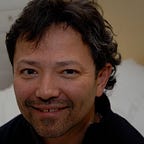The Ethical Political Continuum 5
An overview of some concepts from Deleuze and Guattari’s Capitalism and Schizophrenia.
This is the fifth and final of a series on the ethical and political theory of Gilles Deleuze.
Society of Control
Deleuze and Guattari’s analysis culminates in the central political question we face today:
How might we resist the oppression of state overcoding and the exploitation of state capitalism?
How might we free lines of flight in society, disentangle the machines of desiring-production, restore the process of deterritorialization entrapped in layers of stratified transcendence?
Whereas Michel Foucault spoke of societies of discipline, and techniques of enclosure (prisons, schools, factories, etc), Deleuze suggests we are now in a world that can only be characterized as a society of control.
A society of control does not operate by enclosure but via continuous control and instantaneous communication, social coercion and monitoring at every level in society.
In a world in which a global state capitalism overcodes in the form of a society of control, what might be the micropolitical response?
Becoming Minor
Deleuze and Guattari start off by suggesting there is no such thing as a “majority” of people. The majority is an abstraction that is constituted in “nobody.”
The majority is a nameless, faceless ideal, a concept that only implies a domination model of politics.
The masses do not exist. Real people exist, only as minorities.
Everyone, in some way or another, is caught up in a process of becoming-minor. Deleuze and Guattari refer to the process of becoming-minor as autonomy.
Minoritarians are free in the sense that they are engaged in a process of becoming, in which lines of flight freely connect and disconnect. Minoritarians have the ability to create compositions, connections, convergences and divergences that can stand up to societies of control.
Only minoritarian politics can create the disturbances and fluctuations capable of destabilizing control societies.
Nomads
Minoritarians are nomadic. They do not rely on sedentary transcendent structures and forms; “they are vectors of deterritorialization.”
They are open to new connections. Nomads explore the landscape of the socius, seeking connections in artistic and creative ways, but can disengage with a society of control by refusing to accept the transcendent axiomatics that support it.
To become minor is not to join a particular political group in society that has congealed in one way or another. To become minor, to be a nomad, is to create new possibilities, to experiment with new modes of life, to no longer be bound by the dominant molar lines of society.
To be minor is to release from identity and embrace difference; the pure difference in creativity and experimentation.
No Prescription
Becoming minor involves no specific political agenda or revolution. Deleuze and Guattari offer only the following:
This is how it should be done: Lodge yourself on a stratum, experiment with the opportunities it offers, find an advantageous place on it, find potential movements of deterritorialization, possible lines of flight, experience them, produce flow conjunctions here and there, try out continuums of intensities segment by segment, have a small plot of new land at all times… Connect, conjugate, continue: a whole “diagram,” as opposed to still signifying and subjective programs. (A Thousand Plateaus)
There is no prescription here. No program for how to defeat a control society. If anything, what is presented is purely a vision of how to overcome the desire for our own servitude.
Becoming minor is a vision of experimentation and creativity, affirmation of the active forces in life, in a process of becoming.
I hope you enjoyed this article. Thanks for reading!
Tomas
Please join my email list here or email me at tomas@tomasbyrne.com.
Excerpt from my forthcoming book, Becoming: A Life of Pure Difference (Gilles Deleuze and the Philosophy of the New) Copyright © 2021 by Tomas Byrne. Learn more here.
